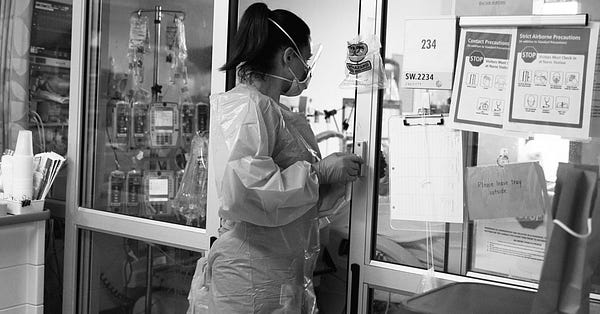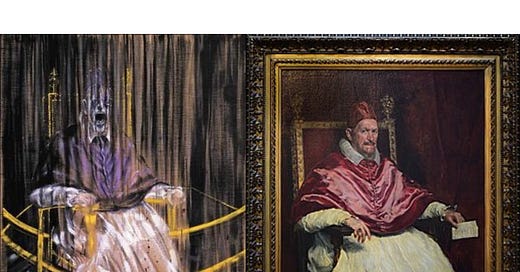What school taught me
The difference between studying for an exam, and learning for life. Insights on China, and discussion of the state of crypto and web3. Meet-ups.
This week, a long thought on the difference between studying for an exam and learning for life. Insights on China from Dan Wang, and discussion of the state of crypto and web3 (Moxie and Vitalik). Plus meet-ups in London, Jan and Feb.
What did I learn at school. I’ve listed 43 ideas (link here) that I suggest could be taught at school. There’s an underlying sense I was not taught those ideas at school (although maybe most of them are what we learn from family). This week, I pondered what I did learn.
It could seem like luck (but really was my parents’ foresight) brought me to a school that fostered independent thinking and an enormous amount of questioning. There was a willingness to follow your curiosity and passions. This lead me to A-Level Art along with four maths and science subjects. I ended up writing to Edward Albee to gain permission to stage Who’s Afraid of Virginia Woolf when his London amatuer agents refused. There was to be a major London West End production. This supposedly caused a hold on all productions including my modest school endeavour. I recall my annoyance that his agents failed to see how my production could not possibly interfere with the West End staging. Albee agreed to my request.
Practicing and studying art demonstrated the emptiness of grades. What value in spending 50 to 100 hours looking at your 16 year old self and painting that self. Is that picture, is that contemplation, is that devotion to looking, re-looking and painting…. an A, B, C or D ?
There were learnings over what we might now call deliberate practice. I slowly improved my drawing by drawing every day. There was a realisation of the role of modern art in attempting to capture a truth about an idea or picture rather than a photographic representation.
Modern art captures an element that is essential and somehow true rather than a representation that has the physics or photographic accuracy. A resonant moment was viewing Diego Velázquez’s painting of Pope Innocent X and Francis Bacon’s version. Velázquez captures so much in a mostly realistic fashion. Bacon’s does the same with a modernist (de)construction.
I try and pass this learning on from time to time.
The deeper learning was on the superficial status of exams and grades in this respect.
Our maths teacher explained to us,
let’s get the exam stuff over early and then we can learn some real maths.
(We did take the exam modules early). There was a sense that although exams were important to tick the boxes, tests were not a true assessment of learning or knowledge. I recall the moment when he explained how there were different set sizes of infinity and you could understand that by analogy of counting off groups of sheep in two pens.
(If you have two pens of sheep and you wish to know if one pen contains more sheep, you can pair the sheep off and if you have left over sheep in one pen, that pen must have contained a larger number. If you think about all the discrete numbers between 1, 2, 3… to infinity as one pen (pen A), and all the continuous numbers between 0 and 1, then you always pair the numbers in Pen A with a number from the second pen (think of one-to-one correspondence), and have numbers left over, so by that thinking it’s a larger set of infinite numbers! You can find using this idea that there are more real numbers than natural numbers. See Gerog Cantor) Ensure class debate on nature of infinity…
Many institutions teach to the exam and strategies to pass them. Exam techniques, reading the question, allocating time, studying likely questions and memorising the syllabus, facts and arguments for those questions. Using spaced repetition or memory palaces to aid memorisation.
This ability to guess the essay question in advance and only prepare for that by rote memory might be called a type of “hack”. A short cut and workaround that obtains the desired result. This hack is teachable but the deeper learning is that hacks are not life learnings.
Excelling at these hacks can be a disservice if you fail to realise this point.
I observed some of these people who excelled later in life. Good memories, abilities to synthesise and analyse ideas and systems but they were mostly trying to life hack their way through work. To guess the essay question in advance. Excelling at the short cut heuristics that can ace test papers. How can I get this product to sell? Is there no hack for it ? Mostly not. You need to make a product that people want. Wrapping a poor product in gloss will fail.
How do you hack a self-portrait if you wish to capture an essential truth about yourself ? It seems as silly as asking how do you hack friendship ? How do you assess the future worth of a business ? The hack is putting a few numbers into a discounted cash flow but that seldom gives you the real answer.
There are elements of work ethic, what we might call grit and stamina that can help but the idea I managed to learn was the exam was not the answer, was not the knowledge, was not the point. In the way that the map is not the actual territory. An over reliance on hacks, like an over reliance on a model, may mean you miss the real truth and knowledge.
As an aside, you can see some of that development in many fields. Observe the sustainability and environmental social governance (ESG) area.
Here, a company management team can ask, how do we do well on this ESG exam? How do we get an AAA grade ? The way to “hack” this is to obtain a good rating from a rating agency. If you examine the tests rating agencies use, you can find many of them are graded on “having an appropriate policy”. So a company management team can write various policies and put them on the website and they will have “hacked” the rating. They pass the exam, but a policy in itself is not sustainability, it’s often not anything to do with the real world.
I can observe this effort to hack, on occasion, in people looking for investment in their pitches. They want to “hack” what investors want. Long-term sustainable investors want companies to develop and grow products and services that customers love because these products solve problems or challenges for them. Those problems may be related to health, the environment, food or so on. There’s no short-cut hack for creating long-term sustainable value.
I was fortunate to glean that lesson from school and travelling (which my parents also very much encouraged) and perhaps schools today don’t really teach it either, but I think it is perhaps one of the most valuable life lessons.
I hosted a podcast with Stephen Unwin (link here).

Stephen Unwin is a theatre director and writer. Amongst many accomplishments he has been the artistic director of the Rose theatre, founder of ETT, English Touring Theatre. He is also chair of the charity Kids, which provides services to children with disabilities. His Twitter is here.
We speak about whether we need language to be human and what non-verbal people teach us.
We chat on how theatre has developed over the decades and Steve’s appreciation of Brecht and the Berliner Ensemble. We touch on Steve’s experience of the Traverse theatre, dealing with the very different stakeholders of the Rose Theatre; and how European theatre, realism and London has influenced theatre over the decades; what’s enjoyable about theatre over film.
Steve discusses how much of liberal progressive thinking may overlook the history and challenges of disability. While contested, we chat about the possible roots of this in the 18th century enlightenment and its influences today. We talk about the importance of self-advocacy but also the challenges of self-advocacy if you are - for instance - non-verbal.
Steve talks about going viral on Twitter around “mock gloom” and disability. He also provocatively suggests five of the greatest artists of the last century.
We comment on:
Bob Dylan
The artist Piero della Francesca
And what he has in his library of thousands of books
And finish with his current projects and life advice Steve has. Transcript (link here) and podcast direct below, or where you get podcasts…
I’ve learned more about the state of China from reading Dan Wang’s letter than a year’s worth of newspaper or journal articles.
Dan also makes an intriguing call for a more fact-based assessment of China (and US) strengths and weaknesses, but to the extent that areas are hard to fathom (eg does US business decouple from China) he also suggests that analysts must still make judgments (cf Marshall).
A good analyst possesses the boldness to offer conclusions. One cannot be confined simply to descriptive analysis and then insist that there are too many unknowns to make predictions. The point of every exercise must be to produce a judgment. These are good lessons for any analyst.
This is an element that matters within investment as well.
Dan also notes that things are getting better and getting worse in many respects at the same time. I think that idea is often true about so many areas. And further that two contradictory solutions might be needed. For instance, in the UK - to my mind - the healthcare system, NHS, needs much more investment and needs much more efficiency. Both can (and should) be done.
His letter:
Moxie Marlinspike co-founded Signal, the privacy focused messenger app. He recently dipped into web3 / crypto and came away with many insightful critiques.
Worth pondering. Much of it resonates with me. Moxie ends up uncertain as to whether (in my words) the crypto ecosystem is now “too big to fail”, too invested in by too many wealthy, influential people, and people who truly believe. I am now coming to the view that it is more likely to stay than not; but believe, like Moxie, the utopians who dreamt of the decentralisation benefits of web3 are mistaken.
Still also worth pondering one of the smartest people here, Vitalik Buterin (a founder of Ethereum) who has a response.
You need to understand the basics to comprehend what both are discussing - but noteworthy.
Moxie:
And response from Vitalik:



I’m going to be holding small meet-ups in Q1 in London. Maybe about 10 to 15 or so of us. Dates Jan 27 and Feb 24. It’s evolving but my rough first stab of what it might be is here. Though it might end up as more of a round table chat for an hour or two. Let me know if you want to come.
Links:
US healthcare under strain:


On energy prices. The price cap is not the problem nor NetZero.

Bowie:
A pigeon on the Tube with us.
A criminal barrister view on Coulson statue damage case / law. (What you think here seems mostly ideological and dependent on where one sits.) I think if one can take a step back, one can observe that society changes the law / norms when certain (minority) groups campaign loudly (think suffragettes) and then the wider public opinion changes, which gets laws changed).


On motherhood and caring:


On hand dryers and special interests.








